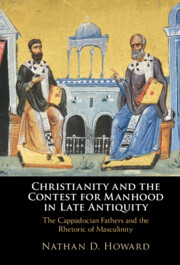 Christianity and the Contest for Manhood in Late Antiquity
Christianity and the Contest for Manhood in Late Antiquity Book contents
- Christianity and the Contest for Manhood in Late Antiquity
- Christianity and the Contest for Manhood in Late Antiquity
- Copyright page
- Dedication
- Contents
- Acknowledgments
- A Note on Translations
- Abbreviations
- The Cappadocian Fathers and their Families
- Introduction
- 1 “The Sweat of Eloquence”
- 2 The Agōn of Friendship
- 3 Hagiography and Masculinity
- 4 Agōn and Theological Authority
- Epilogue
- References
- Index
2 - The Agōn of Friendship
Sensory Rhetoric, Gift Exchange, and the Aesthetics of Aretē
Published online by Cambridge University Press: 10 November 2022
- Christianity and the Contest for Manhood in Late Antiquity
- Christianity and the Contest for Manhood in Late Antiquity
- Copyright page
- Dedication
- Contents
- Acknowledgments
- A Note on Translations
- Abbreviations
- The Cappadocian Fathers and their Families
- Introduction
- 1 “The Sweat of Eloquence”
- 2 The Agōn of Friendship
- 3 Hagiography and Masculinity
- 4 Agōn and Theological Authority
- Epilogue
- References
- Index
Summary
Chapter 2 explores the circulation of masculinity through the lens of friendship and sensory rhetoric.Coordinating the language of Christian fellowship and classical friendship, the Cappadocians involved correspondents in an aesthetic based on a union of souls.Using imagery of the body to express affinity of soul, the Cappadocians engaged correspondents in an agōn predicated on mutual faith and/or shared manhood.These letters of affection mimicked the language of contest with the Cappadocians choreographing encounters based on reciprocal seeing, speaking/hearing, and touching. In portraying union of souls through corporeal imagination, the Cappadocians reordered the bodily senses as masculine.These friendships were reinforced through the care taken in the penmanship of the letters and careful selection of messengers, elements that reflected the performative nature of correspondence. And through framing correspondence as a form of gift-giving, the Cappadocians further underscored friendship and Christian fellowship as elements of masculinity rooted in the traditions of classical Greece.
Keywords
- Type
- Chapter
- Information
- Christianity and the Contest for Manhood in Late AntiquityThe Cappadocian Fathers and the Rhetoric of Masculinity, pp. 103 - 154Publisher: Cambridge University PressPrint publication year: 2022
